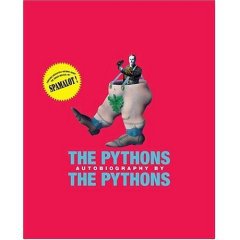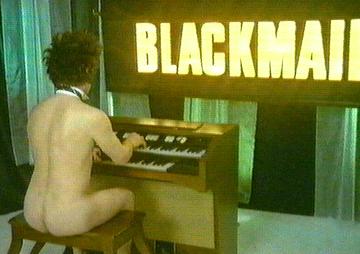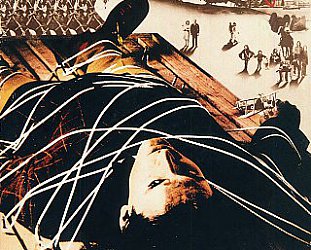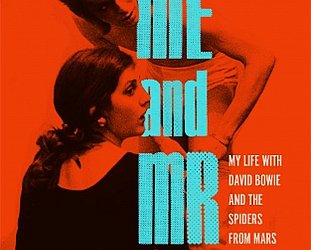Graham Reid | | 3 min read

The shadow of the Beatles is cast long over Monty Python's Flying Circus. The late George Harrison always said he felt something of the band's spirit passed to Monty Python, which appeared on television as the Beatles were breaking up, and Paul McCartney would stop recording to watch the show.
Harrison later underwrote the Pythons' Life of Brian feature film (using his home as collateral) and helped Python's Eric Idle make his Beatles parody film The Rutles: All You Need is Cash.
Because of those associations, it is appropriate the Monty Python Autobiography -- a lavish, large-format doorstop -- should adopt the same formula as the Beatles' Anthology memoir-cum-autobiography. Here too the members offer informal potted autobiographies, then move into telling their own version of events (sometimes at odds with how others remember them) which led to the rise of Monty Python as the finest and most heretical comedy to come out of Britain since The Goons.
The late Graham Chapman ("he has ceased to be") contributes -- as did dead Lennon in the Anthology -- through the numerous interviews he gave in his lifetime and notably from his hilarious 1980 book A Liar's Autobiography Volume VI.
The separate pre-Python stories -- into which are woven a generation of formative and formidable British comics and satirists, including Peter Cook and Dudley Moore, David Frost, Dick Emery, and various Goons and Goodies -- are instructive in giving the lie to the belief that Python's humour was undergrad and public (private) school stuff: Eric Idle notes only two out of the six went to public school, and that it was "postgraduate humour, by the time we're writing Python, we've all been through Cambridge and Oxford".
Certainly those universities fuelled their competitive spirit and gave them the opportunities and supportive audience they required: American Terry Gilliam speaks for them all: "To me, college was wonderful. It was like being in this safe, secure world where everybody's intelligent, and you can start jokes at a certain level already."
 Through the Footlights Club at Cambridge, then into writing for the breakthrough weekly satirical shows on television helmed by David Frost, the disparate Python team gradually assembled.
Through the Footlights Club at Cambridge, then into writing for the breakthrough weekly satirical shows on television helmed by David Frost, the disparate Python team gradually assembled.
The cultural climate of the 60s -- post-Goons with Spike Milligan's absurdist comedy show Q5 already popular on television -- allowed the Pythons to explore the peripheries of parody, satire, surrealism and oddball intellectual eccentricity.
Their different configurations of characters allowed for diversity, and their education gave them a great well of ideas to draw on. They were also businesslike, and what looked improvised on screen had been carefully and competitively scripted and honed to perfection.
Terry Jones remembers a childhood joke that went wrong, which made him realise comedy was a dangerous business: "The moment you do something that's meant to be funny and someone doesn't find it funny, they become angry. It's almost as if they resent the fact that you tried to make them laugh and failed. Nobody comes out of a mediocre performance of Hamlet seething with rage because it didn't make them cry. But just listen to people coming out of a comedy that didn't make them laugh." 
The Pythons made many people laugh, however, and they took off in the States, were dubbed into various European languages (with mixed and mixed-up results) and took their shows on tour like a rock band. Inevitably they moved into movies. All this is told in detail in these much illustrated pages.
But from the start, they were very different people and the tragic thread in their story is that of Chapman, who was plagued by alcoholism and was often, to the frustration of the disciplined John Cleese in particular, incapable of performing.
Cleese -- his father's name was actually Cheese -- comes out as ambitious, a perfectionist, aloof and after the cash: "He told me once," says Idle, "and he won't deny this, 'I'll do anything for money', so I offered him a pound to shut up and he took it."
The Python story -- which ends with a stutter after the death of Chapman in '89 -- is told here with honesty and, inevitably, humour. It is punctuated by Gilliam's distinctive artwork and perhaps too many uncaptioned photographs, and probes those undercurrents of anger, violence and fish jokes which made Python unique.
The final pages are disconcerting. Cleese believes Python changed comedy in a negative way ("instead of people taking our stuff to the next stage, they avoided it"). Jones says all they achieved was, instead of adolescent boys going around bullying, they'd go around being silly. Idle notes they are a gang, but will never do anything again because no one particularly wants to. 
Monty Python's Flying Circus made stars of its characters, but this book reminds that it came at a cost.
George Harrison in the Beatles' Anthology said the fans gave their screams, but the Beatles gave their nervous systems.
His words might equally apply here, hilarious though it all was at times.
And they too have ceased to be.







post a comment